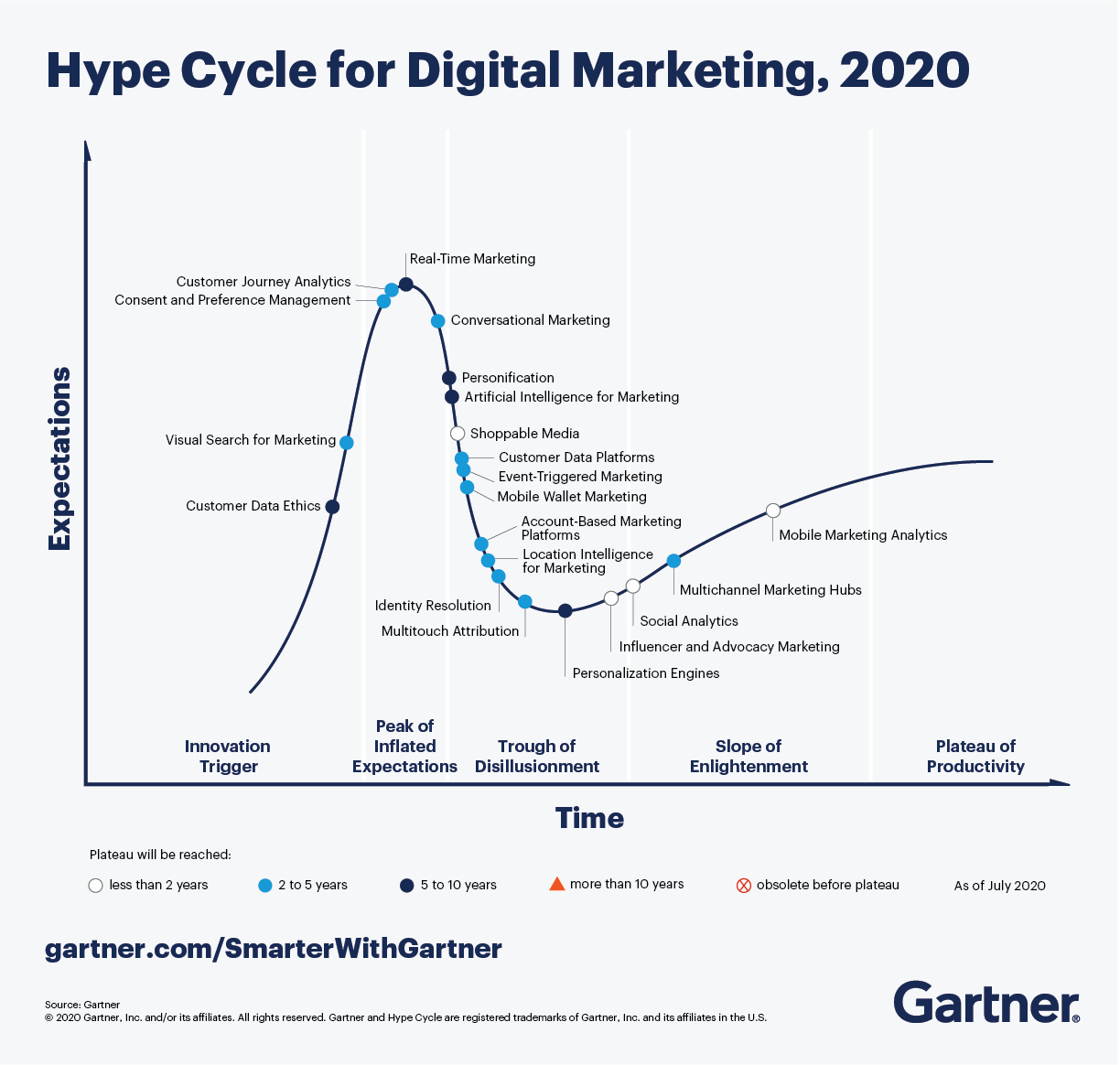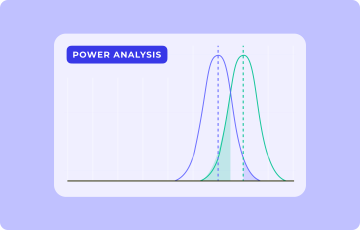
5 major digital marketing innovations to watch according to Gartner
Gartner recently revealed the Hype Cycle for Digital Marketing 2020, its latest annual report that assesses the level of maturity of the major technological innovations shaping the future of online marketing.
Gartner’s analysts have identified five specific innovations that will figure prominently in companies’ digital marketing strategies over the next 5-10 years, around data ethics, real-time marketing, personalization, AI and location-based marketing.

How mature are you when it comes to these digital marketing innovations? How should you incorporate them into your digital experimentation roadmap and choose the technological solutions that will set you apart from your competitors?
1 Customer data ethics becomes a priority
Digital now plays an increasingly important role in everyone’s daily life, meaning that brands are now able to collect more and more data on customer behavior. While the majority of consumers (75%) are looking for personalized online experiences, the security and protection of their personal data remains a priority.
Customer data ethics covers multiple concepts aimed at protecting consumers’ information online and complying with applicable laws, such as the General Data Protection Regulation and CCPA.
This is a particularly important notion when it comes to marketing tactics involving the management and use of large amounts of data: targeting visitors, creating marketing campaigns, segmenting visitors, collecting data or providing services designed to increase loyalty.
This is the first year that Gartner has featured customer data ethics within its Hype Cycle, recognizing that over the next 5-10 years companies will have completely aligned their business practices with data ethics. So, the brands that adopt these new ethical standards fastest will be a step ahead of their competitors, forging a long-lasting relationship of trust with their customers.
Kameleoon, a safe bet for security
To ensure they’re able to protect their visitors’ personal data, brands must have a GDPR-compliant solution.
Kameleoon complies with the GDPR and has already implemented a legal consent policy.
No user data is stored without legal consent and our solution doesn’t use cookies. It works by using local storage, only after obtaining consent. The only data collected is anonymous browsing data that makes it impossible for anyone to identify a visitor.
It is essential to choose a solution that adheres to applicable regulations and is capable of processing your customer data in total compliance with the GDPR while constantly adapting to your data processing instructions.
Kameleoon consent management
The forms of consent you need to obtain from your visitors differ depending on the experiment or test run on your website and their physical location.
Our advanced and differentiated consent management functionality enables our customers to display only the necessary forms of consent and to adapt the experience based on the choices made by visitors and their stated preferences.
Marketers are thus able to improve the visitor experience while guaranteeing compliance with personal data protection requirements.
Personalize the visitor experience despite Apple’s restrictions
Not only are there now personal data protection regulations in place, browsers, such as Apple’s Safari, are also introducing new restrictions concerning data storage in cookies or Local Storage.
This jeopardizes the reliability of your A/B tests and personalizations. Kameleoon offers a unique solution to deal with these new constraints while complying with personal data protection requirements.
Personalization and A/B testing are possible in a world without cookies, but only if you have the right solution.
2 Real-time marketing and personalization solutions
Consumer’s digital journeys and expectations are increasingly varied. To provide visitors with the experience they demand, brands must be capable of addressing their needs in real-time and of adapting to their current behavior or conversion intention.
This requires brands to use solutions that enable them to collect and analyze visitor data in real-time and trigger adapted experiences. This way, they can offer visitors a truly relevant experience that boosts conversion rates.
In its report, Gartner states that the companies with real-time marketing tools will have a head start on their competitors thanks to their capacity to be faster at providing their customers with more relevant offers. By adopting a personalization solution to improve the online experience, they will encourage practices such as upselling, cross-selling or product recommendation, and will also be able to make full use of other channels (including the contact center, brick-and-mortar stores or chat).
Kameleoon: real-time personalization
Our personalization platform enables you to collect and analyze your visitors’ data in real time, then trigger entirely personalized experiences.
Real-time personalization puts you ahead of the competition and lets you replicate the behavior of an in-store sales advisor on your website. By analyzing visitor behavior, you can ascertain their desires and provide them with an adapted experience to guide them towards conversion.
For example, if a visitor views three product pages of headphones then returns to the home page, you could automatically trigger a personalized experience that displays a relevant selection of products based on their browsing journey. You can of course define more complex criteria to further refine the experience.
This means that the experience provided directly meets the visitor’s actual interests. This yields much better results than a general, unpersonalized approach that ignores the context of the visit.
To find out more about personalization, read our comprehensive whitepaper on the subject.
3 Artificial intelligence for marketing
Artificial intelligence (AI) is used in many areas of digital marketing including personalization campaigns, chatbots and stock management.
Of course, artificial intelligence represents a great opportunity for companies, as it can automate many tasks and yield more relevant results than a manual approach.
However, Gartner’s analysts emphasize that this is a real challenge for companies, as they need to have powerful algorithms at their disposal and must upskill their teams to obtain significant results.
AI-driven personalization: Kameleoon’s predictive algorithms
Our AI-driven personalization solution enables marketers to create individualized relationships with their online visitors.
With Kameleoon, it is possible to identify whether a visitor is likely to convert after 15 seconds on the website and to provide a very accurate level of segmentation, which would be impossible manually.
Once the visitor’s heat score (conversion probability) has been identified, an experience adapted to their preferences and needs is delivered on the website.
With a predictive approach to personalization, brands boost their conversions and optimize their costs as their actions are better targeted. Additionally the time saved and agility gained enables teams to focus on the more important aspects of strategy.
Our clients that use the predictive approach to better target their marketing campaigns and optimize their costs obtain results that are up to three times greater than with a manual approach.
> Toyota has doubled the performance of its lead generation campaign thanks to predictive targeting
> Cdiscount has tripled the ROI of its promotional campaigns by using Kameleoon’s AI
> Allopneus is generating 15% more revenue through predictive targeting
4 Location intelligence for marketing
Brands today must develop their omnichannel strategy and offer their visitors a seamless experience across all channels. Location intelligence—or geolocation—plays a strategic role in marketing campaigns since it enables brands to really home in on visitors’ interests and to offer relevant experiences based on the context of the visit.
On this topic, Gartner emphasizes that the geolocation of visitors enables companies to refine their knowledge of customer profiles but also to push messages and offers adapted to their location or to provide appropriate information about the location of brick-and-mortar stores. However, the analysts add that the use of this technology is highly contingent upon companies’ capacity to manage their visitor data in a way that is transparent and that complies with applicable regulations.
Personalize your visitors’ experience based on their geolocation
By using geolocation in their marketing strategy, brands can tailor the context of a visit and the website experience, thus providing a seamless experience between channels.
It’s also vital to be able to locate visitors to display the products available in their geographical area, as well as their prices. It is also possible to go even further by improving the experience thanks to geolocation-based personalization. For example:
- Offer discounts in the visitor's closest store
- Show the most popular products in the visitor’s local area
- Offer products based on actual local weather conditions
Our clients have already been using location intelligence in their personalization strategies for years, with very good results.
> Allopneus has increased conversions by 2.9% by geolocating its visitors
> Toyota directs visitors towards their nearest dealer when offering a test drive.
All these innovations highlighted by Gartner reflect the new requirements of consumers who are accelerating their use of digital channels. The challenge for brands in ultra-competitive markets is therefore to deliver a quality experience to visitors while ensuring that meeting requirements around protecting personal data. Personalization, artificial intelligence or even the capacity to geolocate their visitors will enable them to stand out from their competitors and thus to retain customers over the long term.




